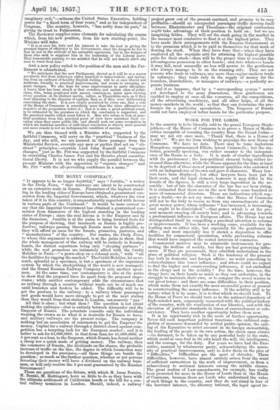TEM MONEY CONSPIRACY.
" IT appears to be no longer doubtful," says " Justitia," a writer in the Daily News, "that railways are about to be constructed on an extensive scale in Russia. Financiers of the highest standing in the leading cities of Europe have obtained a guaranteed concession from the Imperial Government, which, whatever the view taken of it in this country, is unquestionably regarded with favour in various parts of the Continent." It would be more correct to say that the Imperial Government has obtained a guaranteed concession from financiers of the highest standing in the leading states of Europe ; since the real favour is to the Emperor and by the financiers. Justitia is at the pains to bring forward, facts for the purpose of showing, that inasmuch as Russia is highly productive, railways passing through Russia must be profitable, as they will afford an issue for the forests, granaries, pastures, and " manufactures " of the country. Per contra, the Daily News, to whom this argument is addressed, is at the pains to show, that the whole management of the railway will be entirely in Russian hands, the distant copartners being only "sleeping partners " ; while the real promoters are intimately allied with the Credit Mobilier in Paris—" a pawn-shop on a colossal scale," with "all the facilities for rigging the market." The CreditMobilier, let us remark, splendid as a specimen, is but a specimen of the organized system by which the stockjobbing of the world is now managed; and the Grand Russian Railway Company is only another specimen. At the same time, our contemporary is also at the pains to show that the proposed lines lie apart from the proposed em oriums ; while another contemporary adds the circumstance that no railway through a country without roads can be of much use until branches and feeders be added. The difficulty will be to get the produce to the railway : to a railway whose passengers and goods would have more struggle to get at the next station than they would from that station to London, can scarcely "pay." All that is clear; but what then ? The question is not about making the railways—that is entirely between Alexander and the Emperor of Russia. The potentate consults only the individual wearing the crown as to what it is desirable for Russia to have, and military railways are the present recipe. The company is nothing but an association of contractors to get the Emperor the money. Capital for a railway through a district closed against competition has a tempting look for the European market ; and it is better to ask for 45,000,000/. in that form than for 45,000,0001. at 5 per cent as a loan to the Emperor, which Russia has found neither a cheap nor a quick mode of getting money. The railway, then the commerce of Russia, the dividends on the shares, the probable increase of traffic on the line, the degree to which locomotion may be developed in the provinees,—all these things are beside the question; as much as the further question, whether or not persons investing their money will have a dividend on the railway business, or will only receive the 5 per cent guaranteed by the Russian Government?
These are questions of the future, with which M. Isaac Pereire, M. Borski, M. Hottinguer, have as little to do as they have with the ultimate settlement of Californian bonds or the bill for a central railway terminus in London. Should, indeed, a railway
project grow out of the present contract, and promise to be very profitable—should an unexpected passenger-traffic develop itself between Ekaterinoslav and Theodosia—the original contractors might take ad.vantage of their position to hold on : but we are imagining fables. They will set the stook going in the market in the manner most conducive to float it at the highest price. They have made their arrangements with the Russian Government as to the premium which is to be paid to themselves for that work of floating the stook. When they have done that—when they have employed all the requisite arts for attaining the highest possible price for their stook—then will be the proper time to transfer the advantageous possession to other hands ; and into whatever hands it may fall, most assuredly no less will accrue to the gentlemen who always manage to be on the winning side. They aro not persons who trade in railways, any more than engine-makers trade in railways; they trade only in the supply of money for the founders, shareholders, or managers of railways,—a perfectly separate business.
And it so happens, that by a "corresponding system" never yet developed to the same dimensions, these gentlemen are enabled to employ at once all the resources, all the competitions, all the advertising machinery, and all other helps, of all the money-markets in the world ; so that they can determine the preference for a particular speculation. The Emperor of Russia could not have employed better hands for the particular purpose.


























 Previous page
Previous page